Hiccups may be annoying, and as humans, we are well aware of this. But can dogs also have hiccups? Yep. Puppy hiccups are adorable, and you can’t help but chuckle when you see the expression on the dog’s face when they realize they’re making a strange noise.
You can feel anxious if you’ve never dealt with dog or puppy hiccups. Are hiccups in dogs common? Why do puppies and dogs get hiccups? How do you put a stop to them? Please keep reading for more information on how to treat dog hiccups, their causes, and when to take your canine companion to the vet.
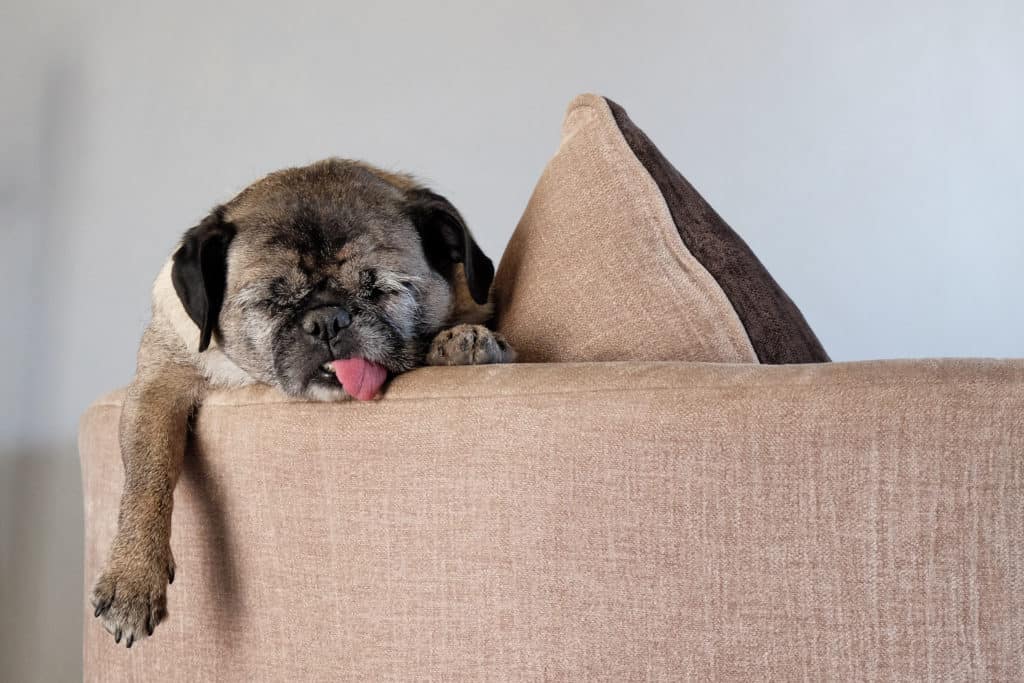
In dogs and pups, hiccups are caused by the diaphragm contracting quickly.
©David Charles Cottam/Shutterstock.com
What Makes a Hiccup “Hic”
In dogs and pups, hiccups are caused by the diaphragm contracting quickly. A narrow, powerful muscle called the diaphragm divides a dog’s chest cavity from their abdomen. The primary muscle involved in breathing is this one. A dog’s diaphragm descends downward and contracts during inhalation to allow the lungs to expand inside the chest cavity.
When dogs exhale, their lungs compress, and their diaphragm relaxes, moving up into their chest cavity. A hiccup happens when the diaphragm suddenly spasms; it generally moves smoothly and regularly. A hiccup is a brief spasm that can result in a little movement and the sound “hic.”
Hiccups are involuntary reflex that, when activated, causes the diaphragm to contract and the vocal cords—more particularly, the glottis—to close quickly, producing the “hic” sound. The diaphragm may contract (also known as a myoclonic jerk) multiple times each minute.
Causes of Hiccups in Dogs
Even though they don’t know why hiccups happen, experts have suggested a few theories. They are a leftover from fetal development. The idea that prenatal hiccups assess the development of respiratory muscles is based on the observation that fetal hiccups happen in various mammalian species. Another likely explanation is that hiccups are merely a mechanism to release gas. Hiccups are often brought on by one of three things, no matter the cause:
- Age: Puppies up to about eight months are most likely to have dog hiccups. Can dogs develop hiccups as they age? They can, but it’s far less common. According to scientists, hiccups may be more frequent in pups because they help to fortify their developing lungs.
- Stress: Additionally, a stress reaction to overstimulation might cause hiccups. Because pups are more prone to overstimulation than older dogs, who are generally better at maintaining calm, they happen more frequently in puppies.
- Eating or drinking quickly: Hiccups can be brought on in the same way that typically causes them in humans: eating or drinking too quickly and inhaling too much air.
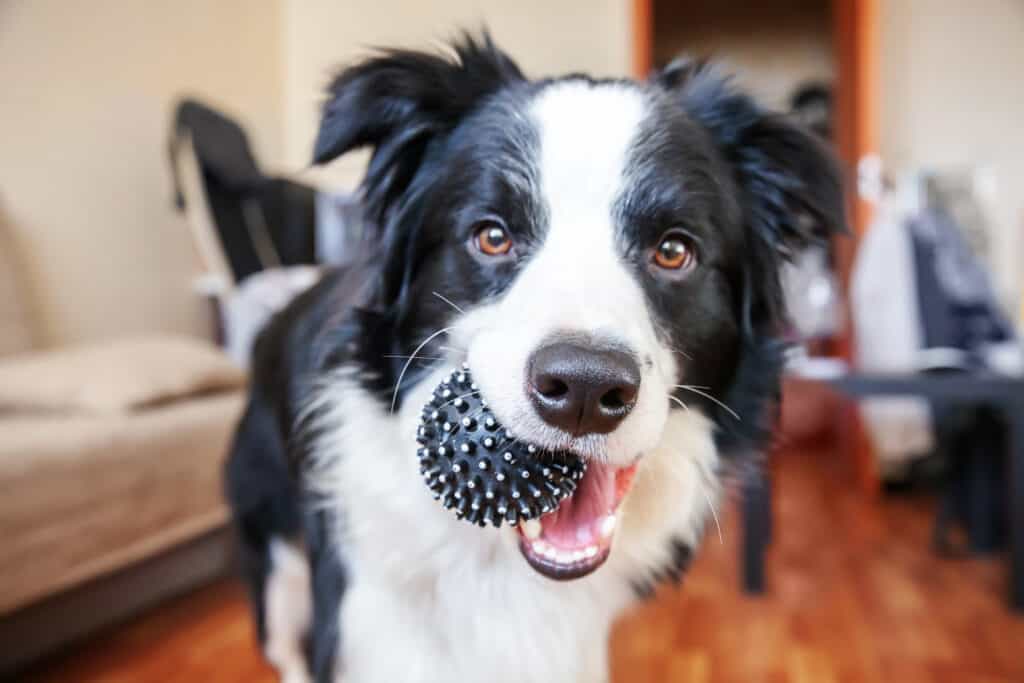
Puppies up to about eight months are most likely to have dog hiccups.
©Julia Zavalishina/Shutterstock.com
How To Help Your Doggie
There are several traditional cures for hiccups, but they rarely work as well on dogs as they do on people. And many aren’t suitable for pets. If your dog had the hiccups, you wouldn’t want to spook them purposefully. After a few minutes, dog hiccups typically go away on their own.
Remember that chest contractions can be pretty violent, so refrain from feeding your pet foods that need extensive chewing, as this could provide a choking risk. Always choose prevention over reaction. Find out what triggers your pet’s hiccups if they frequently occur.
Consider purchasing a slow dog feeder for your dog if they are prone to overeating their food or water. Feeding your dog several smaller meals daily instead of two large ones is an additional choice. The size of their water bowl is another thing to take into account. Bowls with varying heights or levels can make the water flow more slowly and with less air intake.
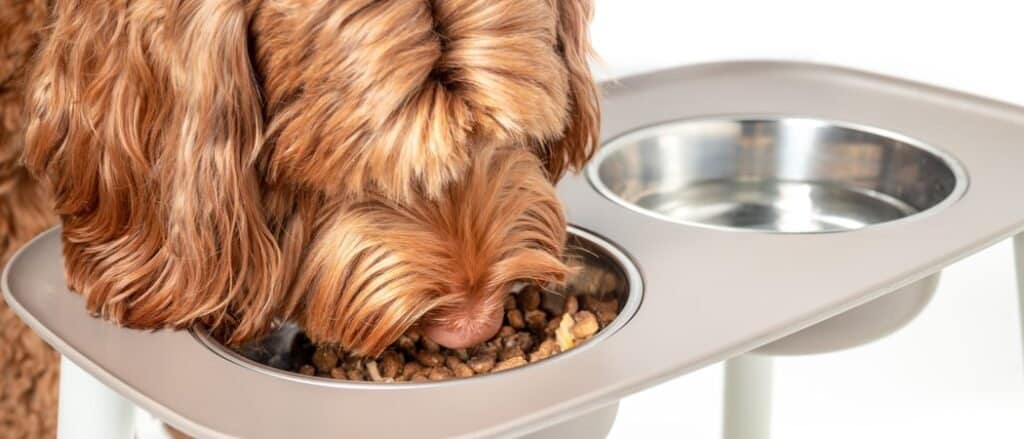
Consider purchasing a slow dog feeder for your dog if they are prone to overeating their food or water.
©sophiecat/Shutterstock.com
When to Worry About Dogs Having Hiccups
Dog hiccups typically disappear after a short while. The hiccup episodes might occasionally last for ten to fifteen minutes. Dog hiccups usually last no more than an hour. You should contact a veterinarian if your dog has had hiccups over that amount. Let’s see what can be the cause of hiccups exceeding the hour mark.
Asthma, Heatstroke, and More Serious Causes
Hiccups may indicate a respiratory condition like asthma or pneumonia if accompanied by additional symptoms like coughing, sneezing, nasal discharge, or wheezing. In dogs, heatstroke can also cause hiccups. This potentially fatal illness can affect any dog, but brachycephalic breeds like Pugs and Bulldogs are more prone because of their constrained airways and small muzzles.
Pericarditis is an inflammation of the pericardium (the sac surrounding the heart). This results in fluid building up between the layers and hypothermia, a severe drop in body temperature brought on by prolonged exposure to freezing temperatures. These are also on the list of potentially severe causes of dog hiccups.
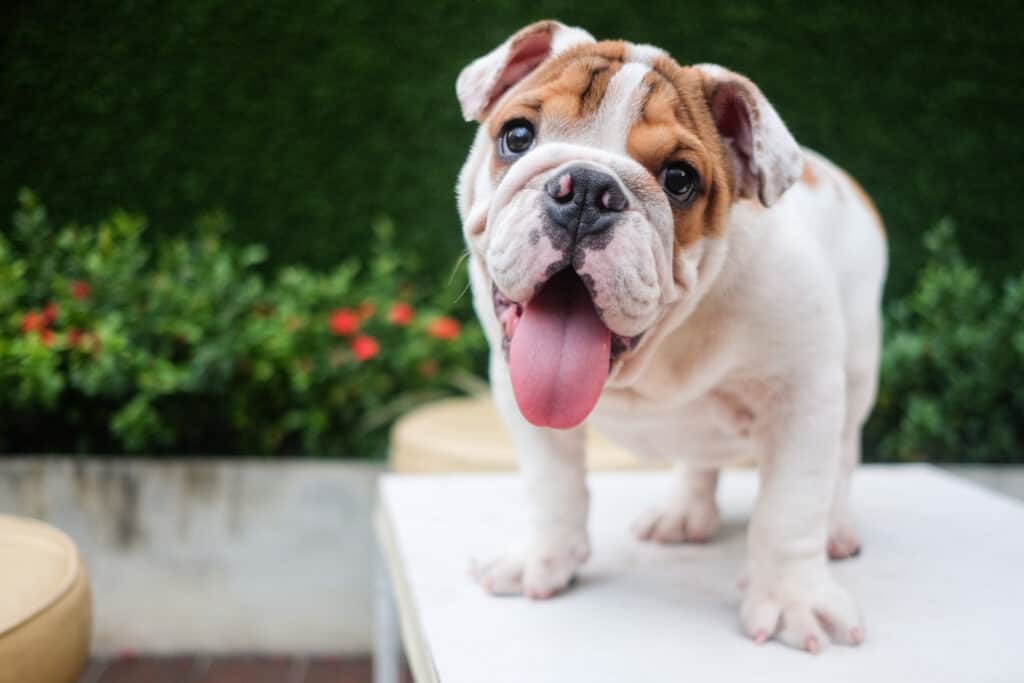
Bulldogs
are more prone because of their constrained airways and small muzzles.
©Ezzolo/Shutterstock.com
Gastric Issues
Your dog’s long-lasting hiccups, diarrhea, vomiting, and bloody feces could be signs of gastrointestinal (GI) issues. A parasite infection may present with the same symptoms, as well as general tiredness and intolerance to physical activity.
Parasites can also attack your pet’s respiratory system, like hookworms and roundworms. Make sure your dog is on a deworming schedule if they are still puppies. They should be dewormed at two, four, six, eight, and twelve weeks as a puppy every three months after that.
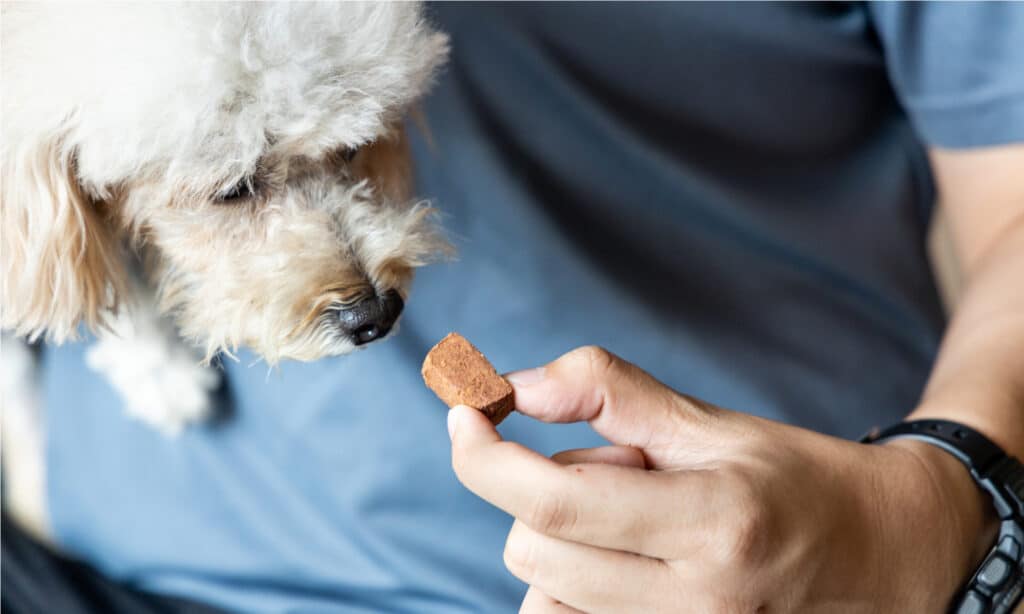
Parasites can also attack your pet’s respiratory system, like
hookworms
and roundworms. Place your dog is on a
deworming
schedule.
©ThamKC/Shutterstock.com
Conclusion
Hiccups might be annoying if you’re the one having them and might also annoy your pup. Most of the time, it’s a cute thing to see dog hiccups, especially puppies, because what’s more adorable than that? If you are worried that the hiccups are caused by anything alarming and have other symptoms, then take them to the vet just in case.
Slow feeders and waterers are helpful for dogs that eat or drink too fast. Hiccups don’t hurt, so it may not be a hiccup if your dog acts like they are in pain. It’s safe to say your pup will likely make a full recovery from them. If you learned something new, then share it with other doggie owners so they can learn too. Check out more exciting dog questions with in-depth answers down below!
Up Next:
- Can Dogs Get COVID-19? Symptoms, Risks, and Prevention
- Can Dogs Get Pink Eye, How Do You Treat It?
- Can Dogs Get Headaches? How Can You Tell?
The photo featured at the top of this post is © iStock.com/kellyvandellen
Ready to discover the top 10 cutest dog breeds in the entire world?
How about the fastest dogs, the largest dogs and those that are -- quite frankly -- just the kindest dogs on the planet? Each day, AZ Animals sends out lists just like this to our thousands of email subscribers. And the best part? It's FREE. Join today by entering your email below.
Sources
- The Vets / Dr. Ellen Marcinkiewicz, Available here: https://thevets.com/blog/dog-hiccups/
- Volhard Dog Nutrition, Available here: https://www.volharddognutrition.com/blog/what-should-i-do-if-my-dog-gets-the-hiccups/
- Great Pet Care / Liz McCalley, Available here: https://www.greatpetcare.com/dog-health/dog-hiccups/
FAQs (Frequently Asked Questions)
Why do dogs get hiccups?
Hiccups are involuntary reflex that, when activated, causes the diaphragm to contract and the vocal cords—more particularly, the glottis—to close quickly, producing the “hic” sound. The diaphragm may contract (also known as a myoclonic jerk) multiple times each minute.
How do you help your dog with hiccups?
After a few minutes, dog hiccups typically go away on their own.
Remember that chest contractions can be pretty violent, so refrain from feeding your pet foods that need extensive chewing, as this could provide a choking risk. Always choose prevention over reaction. Find out what triggers your pet’s hiccups if they frequently occur.
Thank you for reading! Have some feedback for us? Contact the AZ Animals editorial team.






